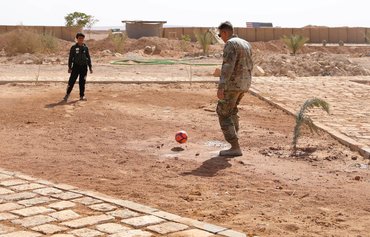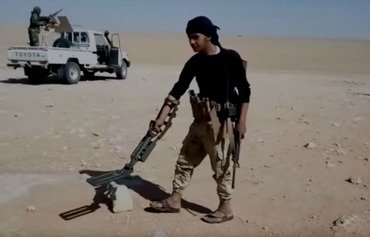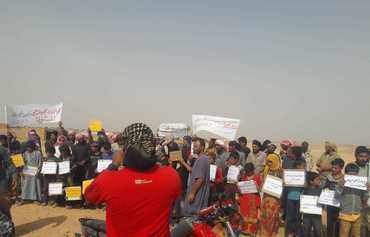The UN will facilitate voluntary departures from al-Rukban camp for Syrian refugees near the Jordanian border and will provide assistance to those who choose to remain, the organisation said this month.
About 17,700 people have voluntarily left al-Rukban since February, after the residents were offered transport and assurances of safe passage from the Syrian and Russian authorities.
But thousands still live in squalid conditions in the desert camp, located in the no-man's land near al-Tanf military base on the country's southern border with Jordan.
A joint UN-Syrian Red Crescent delegation conducted a five-day mission at al-Rukban from August 15th to the 19th to assess the needs of camp residents and determine the number of those who wish to return to regime-controlled areas in Syria, said al-Rukban camp relief worker Tareq al-Nuaimi.
![A joint UN-Syrian Red Crescent convoy recently visited al-Rukban camp to conduct a comprehensive survey of those who wish to leave to Syrian regime-controlled areas. [Photo courtesy of Tareq al-Nuaimi]](/cnmi_am/images/2019/08/30/19611-Syria-UN-mission-600_384.jpg)
A joint UN-Syrian Red Crescent convoy recently visited al-Rukban camp to conduct a comprehensive survey of those who wish to leave to Syrian regime-controlled areas. [Photo courtesy of Tareq al-Nuaimi]
![Fighters from Jaish Maghawir al-Thawra provided security for a UN-Syrian Red Crescent delegation that visited al-Rukban camp on Syria's southern border with Jordan in mid-August. [Photo courtesy of Tareq al-Nuaimi]](/cnmi_am/images/2019/08/30/19612-Syria-Maghawir-security-600_384.jpg)
Fighters from Jaish Maghawir al-Thawra provided security for a UN-Syrian Red Crescent delegation that visited al-Rukban camp on Syria's southern border with Jordan in mid-August. [Photo courtesy of Tareq al-Nuaimi]
The delegation was placed under the protection of Jaish Maghawir al-Thawra, a Free Syrian Army (FSA) faction backed by the international coalition, for the entire duration of the visit, he told Al-Mashareq.
The delegation met with camp notables and the tribal and local councils to discuss proposals to put an end to the camp’s crisis, he added.
Dire conditions
A blockade imposed by the Syrian regime has prevented the entry of humanitarian aid to the camp, which, combined with the suspension of aid from Jordan since 2018 -- apart from the occasional UN and Red Crescent convoy -- have made the living conditions very dire.
These conditions drove thousands of civilians to opt to leave the camp toward regime-controlled areas, al-Nuaimi said, noting that "they are held in shelters for long periods of time before they are allowed to return to their areas".
The men are also taken away to perform mandatory military or reserve service, he added.
During its latest visit to al-Rukban, the UN delegation did not deliver any aid but promised to "bring in a new batch of aid on the next visit, which will be dedicated to those who expressed their desire to stay in the camp", he said.
The aid must be approved by the Syrian regime as the route it takes is under regime control and the border is closed on the Jordanian side, he noted.
The camp’s population has dwindled to about 10,000 from the high of about 50,000 who were in the camp last year, Syrian Red Crescent administrative official Mahmoud al-Bunni told Al-Mashareq.
Procedures to facilitate the travel of those who wish to return to government-controlled areas in Syria will be finalised by mid-September at the latest, he said.
Concerns about compulsory conscription, IRGC
Despite the UN facilitating their return, many Syrian refugees prefer to remain at al-Rukban unless they are allowed to return to areas that are not under regime control in Syria.
Bassem al-Ukaidat, a 40-year-old resident of the camp who arrived in mid 2016 from Palmyra, told Al-Mashareq it is very difficult for him to consider returning to regime areas, "given the miserable [living] conditions there, especially in rural areas".
He said he is worried he and his 17-year-old son will be taken away for reserve and compulsory military service as soon as they return, leaving their family without a breadwinner.
Some alternative solutions have been put forth recently, including allowing returns to northern Syria, "but the regime categorically rejected that option", al-Ukaidat said.
Additionally, some Syrians "do not wish to return to areas controlled by Iran's Islamic Revolutionary Guard Crops (IRGC) or the regime amid a lack of security, poor economic conditions and high unemployment rates", he said.
The majority of the camp's residents are from the provinces of Deir Ezzor and Homs, which the IRGC considers to be strategic areas for the Iranian regime's expansionist plans in the region.
Iran's attempt to bolster its influence in eastern Syria serves its regional agenda to open up a passage to Lebanon and the Mediterranean through which it can funnel fighters and arms and expand trade.
"Those who refuse to return are adamant about not returning, especially after reports circulated about the nature of the deployment of the IRGC and its militias [in Syria] and how the youth are being forced to fight in their ranks," al-Ukaidat said.

![The al-Rukban camp along Syria's southern border with Jordan houses thousands of Syrian refugees, who live under dire conditions. [Photo courtesy of Tareq al-Nuaimi]](/cnmi_am/images/2019/08/30/19610-Jordan-Rukban-camp-600_384.jpg)






